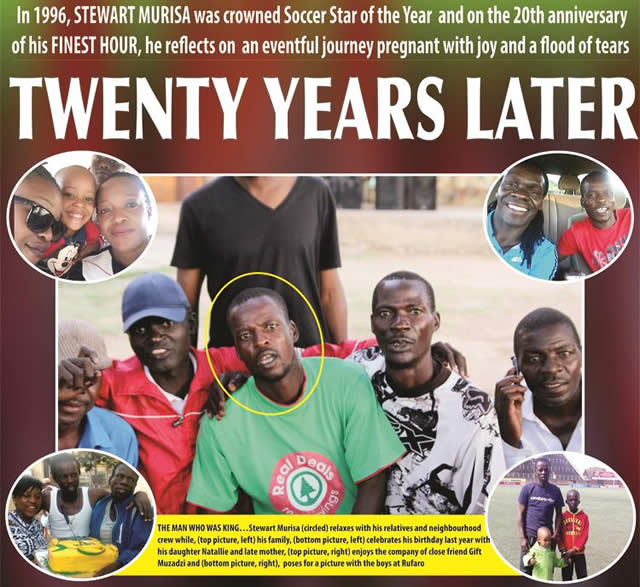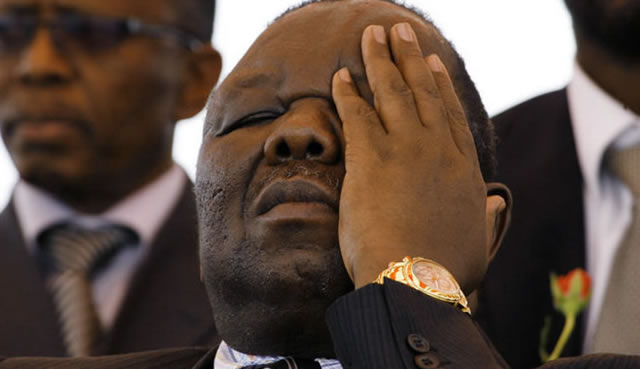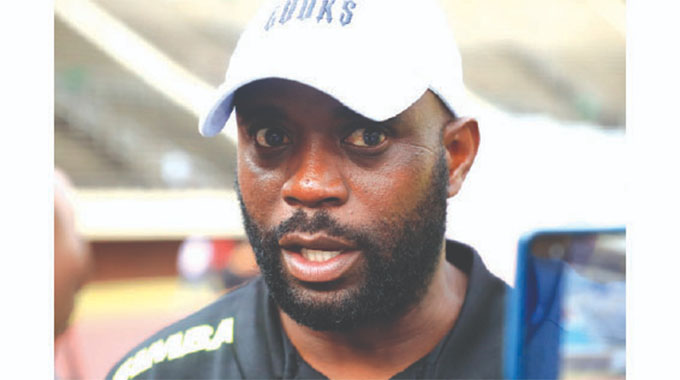TWENTY YEARS LATER

 Eddie Chikamhi Sports Reporter
Eddie Chikamhi Sports Reporter
STEWART MURISA was the poster-boy of the domestic Premiership in 1996, a young and bullish forward who made a big impression he was crowned Soccer Star of the Year, thrusting him into the limelight where he has lived his life ever since. And today, 20 years after his ground-breaking success which triggered a move to South Africa, Murisa is back home working at the club, CAPS United, where he celebrated his finest hour in the game.
Now the coach of the club’s junior side, developing the talent he hopes will make the same impression he made at the Green Machine two decades ago, Murisa has come a long way in this game. And, this week, he reflected on his adventure, the good, the bad and the ugly.
He is back home in Chitungwiza and reflects with both a sense of satisfaction and nostalgia when he looks at the events of the last two decades which have seen his family grow to four children with three of his kids born after his crowning moment of glory in 1996.
Along the way he has also lost his loved ones, including his mother, a former national team netball player who died last year. His brothers, Ngoni and Charles, have also followed in his footsteps playing for Chapungu and Blue Swallows.
“The year 1996 was one of my best seasons. I enjoyed my game so much. Among my memorable moments, I think there was a match I scored three goals in four minutes against Lancashire Steel and the other one I scored five against Mhangura,” he said.
“Then, obviously, being crowned Soccer Star of the Year that same year. We won almost everything except the Castle Cup that year. I think we had a very good squad and at the same time we were more like a family.
“I stayed at CAPS United until June 1997. We played in the Champions League against Orlando Pirates. I played well and they came back knocking, they wanted me to join them, but the manager Lawrence Ngubane left the club just a few days before my departure for South Africa and he joined AmaZulu.
“So he changed my destination. That’s how I ended up at AmaZulu.” Everything looked promising, including a career in Europe. A knee injury kept him from having trials with Dutch giants Ajax Amsterdam.
“I did well in my first season (1997-1998) and finished as the club’s top goal scorer with 10 goals. Then soon after the season an offer came from Seven Stars (who became Cape Town Ajax). They had just been promoted into the Premier League and their striker Benny McCarthy was leaving the club for Ajax Amsterdam,” said Murisa.
“They wanted a replacement and I agreed to move to the club. Unfortunately, I suffered a knee injury between January and February 1999. Then I had my first operation and I was out for two years.
“Injuries are part of the game, but I think if I hadn’t been injured I could have surpassed my achievements. In fact, I could have played in Europe. Those two years I was out dragged me backwards. There was a great opportunity for me to go for trials at Ajax Amsterdam if I had not picked the injury because when I signed for Seven Stars (Ajax) the owner Rob Moore told me that they had earmarked me to go to Ajax Amsterdam. He had said that playing in South Africa was supposed to be the stepping stone for me.”
The injury was followed by a stint back home when he joined Dynamos in 2001 on loan from Ajax Cape Town. The next season, he became one of the few players to feature for all of Zimbabwe’s Big Three when he crossed the floor to join Highlanders. Bidvest Wits were charmed by his form in the first half of the season, when he scored 10 goals for Highlanders and he was lured back to Johannesburg on a three-year contract.
His move to Cyprus with Apop Kinyras lasted only a few months before he returned to South Africa and signed a one-year contract with second-tier side City Pillars.
“Unfortunately, there were cash problems there. I didn’t get my signing-on fees and the salaries were not coming on time. So I got frustrated and I quit,” said Murisa.
“I started coaching a Third Division team in South Africa called Kempton Strikers. The team unfortunately didn’t have sponsors, it was more of social football. The team eventually collapsed in 2006-2007 and then I left football completely. I got a four-to-five job at a printing company in Pretoria and I worked there until 2013.
“I returned home in 2014 and in 2015 I decided to come back to football and went to Lake Harvest as assistant coach to Ralph Kawondera. I was elevated to become the head coach when he left the team six months later and this was a very good experience for me because I saved the team from relegation.
“I then got an offer from CAPS United to be (Darlington) Dodo’s assistant at Gunners. I knew Dodo from long back and with the prospect of going back home at CAPS United I didn’t hesitate.”
He is now working as head coach of the CAPS United junior development as well as assistant to Darlington Dodo in their development side (CAPS-Gunners) currently playing in the Northern Region Division One.
“It’s more about grooming the youngsters and teaching them the CAPS United culture. Looking at our performance as Gunners I think we have quality and our results say a lot about the youngsters and job being done,” said Murisa.
“If these guys take this project seriously, in the very near future we should be reaping the results. We have a very good, talented, and hardworking bunch of youngsters. I want to grow as a coach and probably coach one of the teams. But the thing now is I am still learning and I will keep on learning. Fortunately enough I have people like Darlington Dodo. He is a friend and a mentor and also working alongside CAPS United coach Chitembwe is helping me a lot.”
He regrets his decision to return home from Poland when he first made his break to Europe in 1994. Murisa only lasted a few months at Polish side Miliarder before deciding to come back home and join Blackpool.
“There are decisions that at times we make. I think the decision I made to come back from Poland, I regret that, but then it was also something to do with the fact that, maybe, I was still a youngster,” said Murisa.
“The challenges I faced there were a bit serious, racism was ripe. I remember a game when bananas were thrown at me. Whether playing at home or away it was the same. It was disturbing because you would see someone wearing the replica jersey of your team throwing those racial taunts at you.
“The other thing, football back then in Poland wasn’t as professional as it is now. They were still developing. But I feel I should have stayed there and given myself exposure.”
He started his career as a goalkeeper before switching to being a midfielder in the juniors.
It was Wieslaw Grabowski who turned Murisa into the prolific striker that he became until he left the game for good, at the age of 41, last year with a goal in his final match.










Comments